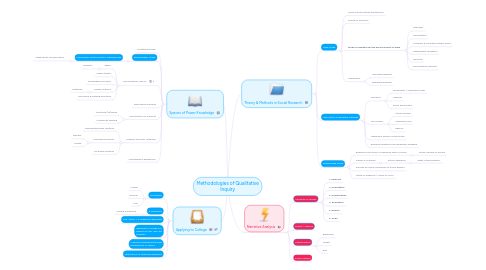
1. Spaces of Power Knowledge
1.1. Poststructuralism
1.2. Ethnographic Study
1.2.1. Foucauldian spatial analytic methodology
1.2.1.1. Subjectivity and education
1.3. Noncontainer view of
1.3.1. space
1.3.1.1. dynamic
1.3.2. subjectivities
1.3.3. knowledge formation
1.3.4. power relations
1.3.4.1. networks
1.3.5. discursive & material practices
1.4. Educational tracking
1.5. Construction of subjects
1.5.1. Iteratively (re)made
1.5.2. Constantly shifting
1.6. Analysis of power networks
1.6.1. Map spatial power relations
1.6.2. Individual practices
1.6.2.1. Identify
1.6.2.2. Isolate
1.6.3. No broad solutions
1.7. "Everything is dangerous"
2. Applying to College
2.1. Portraiture
2.1.1. Miguel
2.1.2. Ricardo
2.1.3. Luis
2.2. 3 Narratives
2.2.1. Unique & different
2.3. The "Other" L.A. presents challenges
2.4. Applying to College is a singular act for well-off students
2.5. Meaning established through perspectives of others
2.6. Short story vs. empirical argument
3. Theory & Methods in Social Research
3.1. Case Study
3.1.1. Social Constructivist Perspective
3.1.2. Inductive, practical
3.1.3. Study-in-depth from the person's point of view
3.1.3.1. Interview
3.1.3.2. Observation
3.1.3.3. Compare & contrast multiple cases
3.1.3.4. Respondent validation
3.1.3.5. Describe
3.1.3.6. Documentary analysis
3.1.4. Challenges
3.1.4.1. Non-generalizable
3.1.4.2. Boundary drawing
3.2. Life History & Narrative Methods
3.2.1. Narrative
3.2.1.1. Temporality / Sequential order
3.2.1.2. Meaning
3.2.1.3. Social Encounters
3.2.2. Life History
3.2.2.1. Social Change
3.2.2.2. Individual Lives
3.2.2.3. Agency
3.2.3. Meaning is socially constructed
3.2.4. Research questions are reflexively engaged
3.3. Researching Policy
3.3.1. Research FOR Policy or Research ABOUT Policy
3.3.1.1. Policy critique or service
3.3.2. Insider or Outsider
3.3.2.1. Action Research
3.3.2.1.1. What is the problem?
3.3.3. Process of Policy Production or Policy Effects
3.3.4. Global or Regional / Macro or Micro
4. Narrative Analysis
4.1. Structure of Stories
4.1.1. 1. Abstract
4.1.2. 2. Orientation
4.1.3. 3. Complication
4.1.4. 4. Evaluation
4.1.5. 5. Results
4.1.6. 6. Coda
4.2. Poetry / Stanzas
4.3. Chronological
4.3.1. Beginning
4.3.2. Middle
4.3.3. End

